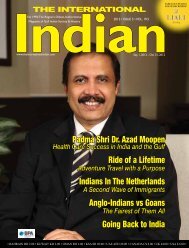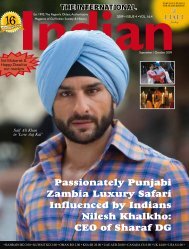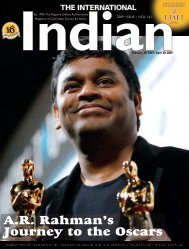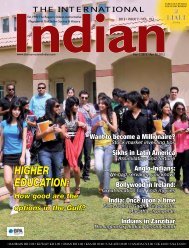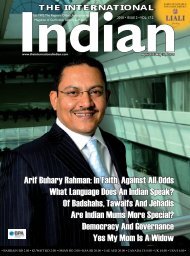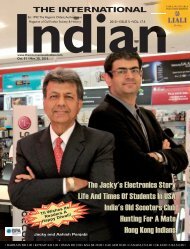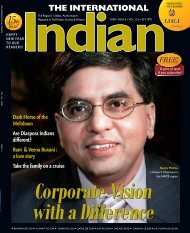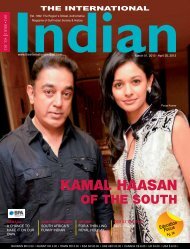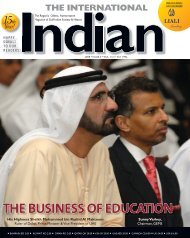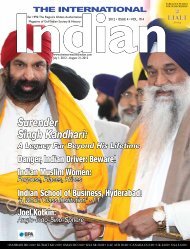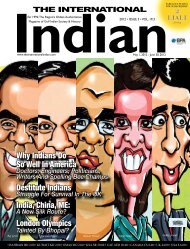Rensil D'Silva: How to Make it in Bollywood Education in the Gulf ...
Rensil D'Silva: How to Make it in Bollywood Education in the Gulf ...
Rensil D'Silva: How to Make it in Bollywood Education in the Gulf ...
Create successful ePaper yourself
Turn your PDF publications into a flip-book with our unique Google optimized e-Paper software.
DIASPORA<br />
Indians <strong>in</strong> UK are a common sight, many<br />
reta<strong>in</strong> <strong>the</strong>ir cus<strong>to</strong>ms and hab<strong>it</strong>s just like<br />
<strong>in</strong> India. Pho<strong>to</strong> cred<strong>it</strong>: Nishi Sharma,<br />
Interserve & South Asian Concern.<br />
would happily open <strong>the</strong>ir s<strong>to</strong>re and<br />
serve <strong>the</strong>m w<strong>it</strong>h a smile.<br />
Indian-owned corner shops were<br />
an <strong>in</strong>st<strong>it</strong>ution as <strong>the</strong>y were open all<br />
hours and attracted ma<strong>in</strong>ly Indian<br />
cus<strong>to</strong>mers and also some English.<br />
The major <strong>to</strong>p name super-s<strong>to</strong>res<br />
were watch<strong>in</strong>g <strong>the</strong>m <strong>in</strong> awe as<br />
<strong>the</strong>y attracted bus<strong>in</strong>ess. Even <strong>the</strong>y<br />
decided <strong>to</strong> jo<strong>in</strong> <strong>in</strong> <strong>the</strong> compet<strong>it</strong>ion<br />
by keep<strong>in</strong>g <strong>the</strong>irs open all hours.<br />
Pr<strong>in</strong>ce Charles, <strong>the</strong> Pr<strong>in</strong>ce of<br />
Wales, paid a tribute <strong>to</strong> <strong>the</strong> Indianowned<br />
corner shops by say<strong>in</strong>g<br />
<strong>the</strong>y had revolutionised Br<strong>it</strong>a<strong>in</strong>’s<br />
shopp<strong>in</strong>g system.<br />
By us<strong>in</strong>g <strong>the</strong>ir clout for bulkbuy<strong>in</strong>g<br />
and lower prices <strong>to</strong><br />
<strong>the</strong>ir cus<strong>to</strong>mers <strong>the</strong> super s<strong>to</strong>res<br />
succeeded <strong>in</strong> rout<strong>in</strong>g <strong>the</strong> small<br />
corner shops which have been<br />
clos<strong>in</strong>g <strong>in</strong> <strong>the</strong> current economic downturn. But his<strong>to</strong>ry is a<br />
w<strong>it</strong>ness <strong>to</strong> how <strong>the</strong>se small Indian shopkeepers taught <strong>the</strong><br />
giants that qual<strong>it</strong>y service attracts cus<strong>to</strong>mers.<br />
Today Indian shops s<strong>to</strong>ck virtually everyth<strong>in</strong>g<br />
produced <strong>in</strong> India complete w<strong>it</strong>h labels <strong>in</strong> H<strong>in</strong>di, Urdu,<br />
Punjabi, Bengali, Gujarati and o<strong>the</strong>r Indian languages.<br />
While shopp<strong>in</strong>g <strong>in</strong> <strong>the</strong>se s<strong>to</strong>res sometimes one virtually<br />
forgets that <strong>the</strong>y are shopp<strong>in</strong>g <strong>in</strong> a s<strong>to</strong>re on Br<strong>it</strong>ish soil<br />
and not <strong>in</strong> Mumbai. Every summer mangoes imported<br />
from India and Pakistan are <strong>in</strong> popular demand as are<br />
o<strong>the</strong>r fru<strong>it</strong>s and vegetables flown from <strong>the</strong>re.<br />
As <strong>the</strong> commun<strong>it</strong>y settled, <strong>the</strong>ir social needs also<br />
grew. London lacked a radio station offer<strong>in</strong>g Indian<br />
music.<br />
It was a great day when London Broadcast<strong>in</strong>g<br />
Corporation (LBC) teamed up w<strong>it</strong>h Indian broadcasters<br />
<strong>to</strong> launch Geetmala, a weekly enterta<strong>in</strong>ment<br />
programme. It was presented by Chaman Lal Chaman,<br />
a well known Indian broadcaster from Kenya and produced by Suresh<br />
Joshi. LBC’s Ke<strong>it</strong>h Belcher was cred<strong>it</strong>ed w<strong>it</strong>h allow<strong>in</strong>g Geetmala <strong>to</strong><br />
come <strong>to</strong> fru<strong>it</strong>ion. That programme became a firm fixture w<strong>it</strong>h thousands<br />
of Indian listeners.<br />
Geetmala ended <strong>it</strong>s run a few years later, but this proved <strong>the</strong>re was<br />
a need for radio stations offer<strong>in</strong>g Indian programmes. O<strong>the</strong>r radio<br />
stations followed.<br />
There were several pirate radio stations run by various ethnic<br />
commun<strong>it</strong>ies, which were raided and closed down by <strong>the</strong> Home Office,<br />
<strong>the</strong> Government author<strong>it</strong>y. They rose aga<strong>in</strong> until <strong>the</strong> author<strong>it</strong>ies realised<br />
<strong>the</strong>y had <strong>to</strong> cater for Br<strong>it</strong>a<strong>in</strong>’s<br />
ethnic m<strong>in</strong>or<strong>it</strong>y commun<strong>it</strong>ies and<br />
<strong>the</strong> best way <strong>to</strong> regulate <strong>the</strong>m was<br />
<strong>to</strong> licence <strong>the</strong>m.<br />
Sunrise Radio was born out of<br />
such a creation. It has prospered<br />
w<strong>it</strong>h <strong>the</strong> creation of several radio<br />
stations and a small slice of<br />
satell<strong>it</strong>e broadcast<strong>in</strong>g.<br />
It is now very easy <strong>to</strong> set<br />
up a commercial Asian radio<br />
station. All you need is money<br />
and a set of very sound reasons <strong>to</strong><br />
conv<strong>in</strong>ce <strong>the</strong> Home office <strong>to</strong> grant<br />
a broadcast<strong>in</strong>g licence.<br />
Meanwhile, BBC TV’s<br />
erstwhile Nayi Z<strong>in</strong>dagi Naya<br />
Jeevan was also on <strong>it</strong>s last legs.<br />
It had served <strong>it</strong>s purpose (and<br />
bored <strong>it</strong>s audiences thoroughly).<br />
BBC TV <strong>in</strong> Birm<strong>in</strong>gham started<br />
Indian cus<strong>to</strong>mers are often attracted <strong>to</strong> <strong>the</strong> paan shop<br />
where <strong>the</strong>y not only enjoy this favour<strong>it</strong>e <strong>it</strong>em but also<br />
congegrate socially and exchange gossip.<br />
revamp<strong>in</strong>g <strong>it</strong>self and <strong>it</strong>s Asian<br />
Un<strong>it</strong> looked at different ways<br />
<strong>to</strong> develop programmes for <strong>the</strong><br />
grow<strong>in</strong>g Indian, Pakistani and<br />
o<strong>the</strong>r Asian commun<strong>it</strong>ies. ITV<br />
also jumped on <strong>the</strong> bandwagon<br />
w<strong>it</strong>h <strong>it</strong>s own programmes for<br />
Asian and Black viewers.<br />
For Asian viewers, Eastern Eye<br />
was broadcast under <strong>the</strong> watch of<br />
Indian broadcaster Samir Shah<br />
and a team that once <strong>in</strong>cluded <strong>the</strong><br />
famous Karan Thapar, Narendra<br />
Morar, Ziaudd<strong>in</strong> Sardar, Shyama<br />
Perera and Aziz Kurtha. I worked<br />
for Samir Shah on a series of<br />
programmes.<br />
For Afro-Caribbean viewers,<br />
<strong>the</strong>re was Black on Black under<br />
<strong>the</strong> watchful eye of <strong>the</strong> highly<br />
respected broadcaster, Trevor<br />
Philips, who is <strong>to</strong>day <strong>the</strong> chairman<br />
of Br<strong>it</strong>a<strong>in</strong>’s Commission for<br />
Racial Equal<strong>it</strong>y.<br />
These programmes ended<br />
<strong>the</strong>ir run after a few years.<br />
While BBC and ITV<br />
controlled <strong>the</strong> terrestrial airwaves<br />
for many years, <strong>the</strong>re was ample<br />
market for cable and satell<strong>it</strong>e TV.<br />
The arrival of Zee TV and<br />
Sony TV revolutionised <strong>the</strong><br />
entire Indian media scene.<br />
Now, viewers <strong>in</strong> <strong>the</strong> UK enjoy<br />
whatever is be<strong>in</strong>g shown on <strong>the</strong>se<br />
channels <strong>in</strong> India. W<strong>it</strong>h a wide<br />
array of programmes <strong>to</strong> choose<br />
from, <strong>the</strong>se TV networks have<br />
actually brought India <strong>in</strong><strong>to</strong> <strong>the</strong><br />
liv<strong>in</strong>g rooms of Br<strong>it</strong>ish Asians.<br />
Apart from <strong>the</strong>se two networks,<br />
Star TV, Star Plus, BFU, Zee<br />
Music and a wide array of o<strong>the</strong>r<br />
channels such as Vectrone, Alpha<br />
Punjabi, Zee Gujarati, have set<br />
<strong>the</strong> media scene ablaze <strong>in</strong> Br<strong>it</strong>a<strong>in</strong>.<br />
In many Asian households,<br />
terrestrial TV channels such as<br />
<strong>the</strong> BBC and ITV have long<br />
been ignored as <strong>the</strong>re is great<br />
enthusiasm <strong>to</strong> watch Indian soaps<br />
and films every day.<br />
Added <strong>to</strong> this is <strong>the</strong><br />
plethora c<strong>in</strong>ema houses such<br />
as C<strong>in</strong>eworld, Himalaya and<br />
various o<strong>the</strong>r <strong>the</strong>atres offer<strong>in</strong>g<br />
latest Indian film releases.<br />
So, far away from home,<br />
people still feel at home <strong>in</strong> Br<strong>it</strong>a<strong>in</strong><br />
th<br />
16<br />
ANNI V ERSARY<br />
w<strong>it</strong>h a wide variety of choice.<br />
Alas, <strong>the</strong> same cannot be said of newspapers for <strong>the</strong> Asian<br />
commun<strong>it</strong>y.<br />
The pr<strong>in</strong>t media, which first started revolutionis<strong>in</strong>g coverage of<br />
Indian events has long been left beh<strong>in</strong>d.<br />
There have been household names, as India Weekly (where I worked<br />
as an assistant edi<strong>to</strong>r <strong>in</strong> <strong>the</strong> 1970s), Eastern Eye, Asian Voice, Garavi<br />
Gujarat, Gujarat Samachar, Asian Trader, Des Pardes, Nav<strong>in</strong> Weekly<br />
and a variety of o<strong>the</strong>r language newspapers and magaz<strong>in</strong>es offer<strong>in</strong>g a<br />
regular diet of news from back home.<br />
The newspapers and magaz<strong>in</strong>es used <strong>to</strong> have a good readership<br />
base at one time but nowadays, apart from first generation Indians who<br />
enjoyed a good read, a lot of <strong>the</strong>se have now crossed <strong>the</strong> floor <strong>to</strong> Indian<br />
TV and radio channels.<br />
The late Chottu Karadia, edi<strong>to</strong>r of <strong>the</strong> weekly current affairs<br />
magaz<strong>in</strong>e, Asian Post, once said sardonically: “Asians simply do not<br />
read! Why don’t our Asians read newspapers?”<br />
The magaz<strong>in</strong>e was los<strong>in</strong>g sales and consequently, advertis<strong>in</strong>g<br />
revenue. Asian newspapers have depended very strongly on local<br />
government advertis<strong>in</strong>g<br />
and a band of loyal<br />
readers. Both of <strong>the</strong>se<br />
have been dw<strong>in</strong>dl<strong>in</strong>g<br />
<strong>in</strong> recent years, mak<strong>in</strong>g<br />
enterpris<strong>in</strong>g Indian<br />
publishers live on<br />
precarious budgets.<br />
The future for <strong>the</strong><br />
Indian owned pr<strong>in</strong>t<br />
media is not very strong.<br />
Radio and TV have a<br />
future here, though,<br />
<strong>the</strong> Chief Executive<br />
of Sunrise Radio once<br />
lamented on air, that<br />
while Indian traders s<strong>to</strong>cked Coca Cola <strong>in</strong> <strong>the</strong>ir shops and s<strong>to</strong>res, <strong>the</strong><br />
mult<strong>in</strong>ational did not see <strong>it</strong> f<strong>it</strong> <strong>to</strong> advertise <strong>it</strong>s brands on his radio station.<br />
Ugandan Asians head<strong>in</strong>g <strong>in</strong><strong>to</strong> force exile by Idi Am<strong>in</strong><br />
That perhaps, says a lot about <strong>the</strong> bus<strong>in</strong>ess of publish<strong>in</strong>g for <strong>the</strong><br />
Indian commun<strong>it</strong>y <strong>in</strong> <strong>the</strong> Un<strong>it</strong>ed K<strong>in</strong>gdom.<br />
Shamlal Puri is a veteran Br<strong>it</strong>ish journalist, broadcaster, author<br />
and press pho<strong>to</strong>grapher. He has worked w<strong>it</strong>h <strong>the</strong> media <strong>in</strong> Europe,<br />
Africa, Asia and <strong>the</strong> Middle East. His latest novel ‘Salik or No<br />
Salik? Welcome <strong>to</strong> Dubai! Tales of Taxi Drivers’ will be released<br />
around <strong>the</strong> world, <strong>in</strong>clud<strong>in</strong>g Dubai, <strong>in</strong> 2010.<br />
He has travelled <strong>to</strong> more than 100 countries <strong>in</strong> an illustrious<br />
journalistic career spann<strong>in</strong>g 30 years. His work has been published <strong>in</strong><br />
more than 250 magaz<strong>in</strong>es, newspapers and journals around <strong>the</strong> world.<br />
60<br />
The International Indian<br />
The International Indian 61



